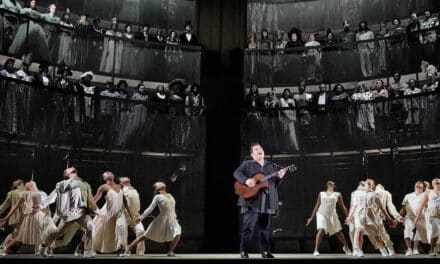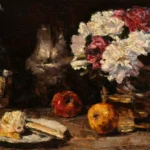Bertolt Brecht schrieb 1941 im finnischen Exil diese Parabel auf die Machtübernahme Adolf Hitlers und der Nationalsozialisten. „Arturo Ui“ wurde eine der bekanntesten und bissigsten Satiren über einen politischen Tyrannen.
Wie fassen wir das kaum Fassbare: den Widerspruch eines durch die Massen gestützten Aufstiegs von monströs wirkenden Tätern? Mit dieser Darstellung haben Künstler wie u. a. Brecht, Tabori, Chaplin oder Lubitsch gerungen. Täter als Strategen in einer komplizierten Matrix der Macht? Demagogen oder am Ende doch nur derbe Clowns mit Talent zur Begeisterung der Massen? Brecht siedelte seine Parabel im US-amerikanischen Gangstermilieu an, ein „Versuch, der kapitalistischen Welt den Aufstieg Hitlers dadurch zu erklären, dass er in ein ihr vertrautes Milieu versetzt wurde“.
Die Stadt Chicago nach dem Börsencrash: Eine Krise jagt die nächste, und wo spart man bei Inflation zuerst? Beim Gemüse. Selbst den sonst so beliebten Blumenkohl will gerade niemand mehr kaufen. Chicagos Gemüsehändler verzweifeln. Gestern noch im Ruhm und festen Bewusstsein, zu den führenden Blumenkohlhändlern der Erde zu zählen, heute schon bankrott.
Des einen Leid ist des anderen Freud — das wittert Chicagos Gangsterboss Arturo Ui. Er weiß, selbst aus der größten Misere der Menschen lässt sich Kapital schlagen, und bietet an, den Gemüsehandel durch Androhung von Gewalt bei der Bevölkerung anzukurbeln. Statt sich auf den fauligen Deal Arturos einzulassen, schmieden die feinen Herren des Blumenkohls ihre eigene politische Intrige.
Premiere 13. Oktober 2023
weitere Aufführungen: 20. Oktober, 4. November, 3. und 27. Dezember 2023, 9. Februar, 14. und 28. März sowie am 18. April und 3. Mai 2024

















